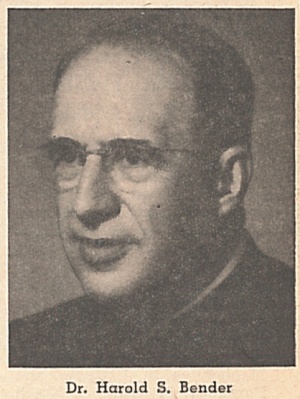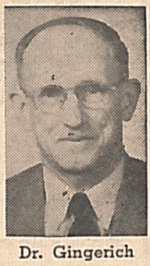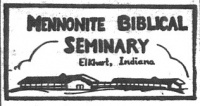If this site was useful to you, we'd be happy for a small donation. Be sure to enter "MLA donation" in the Comments box.
Bender, Harold S. (1897-1962)
Mennonite Weekly Review obituary: 1962 Sep 27 p. 1, 3
Birth date: 1897 July 19, Indiana
Date of Death: 1962 September 21, Chicago, Illinois
text of obituary:
World Conference President,
Seminary Dean Dies in Chicago
Goshen, Ind. — Harold S. Bender, Mennonite educator and historian and probably the most widely known leader in the world-wide Mennonite brotherhood, died Friday evening, Sept. 21, at Presbyterian-St. Luke’s Hospital in Chicago at the age of 65.

In failing health for the past year, Dr. Bender had retired from the deanship of Goshen College Biblical Seminary on Sept. 1. He entered the Chicago hospital on Tuesday, Sept. 18, for further treatment of cancer. His death was believed caused by a stroke suffered Friday afternoon while reading in his hospital bed.
In August, after undergoing surgery at the Chicago hospital on June 29, Dr. Bender was able to participate in part of the Seventh Mennonite World conference at Kitchener, Ont., of which he was president. He had been president of the world meeting since the 1952 session in Switzerland.
At Goshen for 38 Years
A gifted teacher, writer, and administrator, and a recognized authority on Anabaptist history and thought, Dr. Bender had been associated with Goshen College and the Biblical Seminary for 38 years. He served as dean of the college from 1931 to 1944, during which time the school was accredited by the North Central Association.
He had been dean of the Goshen College Biblical Seminary since 1944. In this position he also had a leading part in developing the Associated Mennonite Biblical Seminaries program in cooperation with the Mennonite Biblical Seminary at Elkhart.
In addition to his work as an educator and a scholar, his contributions in the Mennonite (Old) Church and to the Mennonite denomination as a whole were many and varied. He served as editor of the four-volume Mennonite Encyclopedia, inter-Mennonite undertaking to which he contributed many articles. He is the author of 10 books and wrote extensively for scholarly journals and church papers. As a theologian, he made a significant contribution to Mennonite theology and doctrine.
Among the many positions he filled in the Mennonite (Old) Church were those of chairman of the Mennonite Relief and Service Committee and chairman of the Peace Problems Committee and the Historical and Research Committee.
Dr. Bender served for a number of years on the executive committee of the Mennonite Central Committee. His work on behalf of the MCC and the Mennonite World Conference took him on frequent trips to Europe. He was active in joint efforts of the Historic Peace Churches and in the post-war years served as Mennonite representative at a number of theological and church conferences in Europe.
Educated in Europe, America
Born at Elkhart on July 19, 1897, Dean Bender graduated from Goshen College in 1918 and then served on the faculty of Hesston College in Kansas for two years. He received the B. D. degree from Garrett Biblical Institute in 1922, the M. A. and Th.M. degrees from Princeton University in 1923, and in 1936, the Th.D. from Heidelberg University in Germany.
Soon after returning to Goshen in 1924 Dr. Bender’s keen interest in Mennonite history led him to organize the Mennonite Historical Society. He had a leading part in developing the Mennonite Historical Library at the college, and in 1927 he originated the Mennonite Quarterly Review of which he was editor.
Recognized here and abroad as a church historian, he served terms as president of the American Society for Church History and the American society for Reformation Research.
In 1923 Dr. Bender was married to Elizabeth Horsch, daughter of the later John Horsch, Mennonite historian and writer. She survives with their two daughters, Mary Eleanor, a teacher at Goshen College, and Mrs. Gregory (Nancy Elizabeth) Kosteck, who is studying music in Amsterdam. Also surviving are three brothers, Wilbur J. of Cambridge, Mass., John of Philadelphia, and Dr. Robert of Elkhart and two sisters, Miss Florence Bender of Toledo, Ohio, and Mrs. J. Sheldon (Violet) turner of Thailand.
Dr. Bender was a member of the Goshen College Mennonite Church, where the funeral services were held. Tuesday afternoon, Rev. John Mosemann, the pastor, and Dr. Paul Mininger, president of Goshen College, officiated. Burial was made in the Elkhart Prairie Cemetery south of Goshen.
Mennonite Weekly Review obituary: 1962 Oct 4 p. 3
text of obituary:
Funeral Services For H. S. Bender Largely Attended
Goshen, Ind. — Approximately 2,000 persons attended the funeral of Dean H. S. Bender on Tuesday afternoon, Sept. 25, in the Goshen College Church-Chapel. Among them were representatives of many church organizations and institutions from many states and Canada as well as other friends and relatives.
Since 1944 Prof. Bender had served as dean of Goshen College Biblical Seminary and for many years had been active in the life of the Mennonite Church.
After a family prayer service in the seminary chapel, led by C. L. Graber, a memorial service was held in the church-chapel under the direction of the pastor of the Goshen College Mennonite Church, John H. Mosemann. The music consisted of congregational singing, numbers by the Seminary Chorus, and the rendition of part of Bach's “Jesu, Priceless Treasure” by the Motet Singers.
Short testimonies concerning the work and influence of Dean Bender were given by six men associated with him in recent years, under the theme “I Have Finished My Course.” Carl Kreider spoke on Dean Bender's work in Goshen College, Howard Charles on his contribution to the Goshen College Biblical Seminary, John C. Wenger on his work in Mennonite research and in the district conference, A. J. Metzler on his activity in Mennonite General Conference and the Mennonite Board of Education, Orie O. Miller concerning his contribution to Mennonite relief and service activities and to the Mennonite Central Committee, and Erland Waltner on his influence in the Associated Mennonite Biblical Seminaries and in the Mennonite World Conference.
The opening Scripture reading and prayer was given by S. C. Yoder. President Paul Mininger of Goshen College spoke on “I Have Kept the Faith” and pastor John H. Mosemann on “Henceforth.” The interment was in the Elkhart Prairie Cemetery.
Mennonite Weekly Review obituary: 1962 Oct 4 p. 6
text of obituary:
HAROLD S. BENDER (1897-1962)
By Melvin Gingerich
I HAVE KNOWN Harold S. Bender well since 1924 and intimately since 1947. During the first years of this period, I sat in his classes and observed his work in the field of Mennonite history. In more recent years I was associated with him in the production of the Mennonite Encyclopedia, The Mennonite Quarterly Review and in the work of the Mennonite Research Foundation. At the same time I served with him in the Historical Committee and the Peace Problems Committee of the Mennonite Church. These many, almost daily, contacts enabled me to observe his manner of work and to sense his convictions.

Few men in American Mennonitism have shaped the lives of so many persons in the church as did Harold Bender. The constant stream of letters that came to his office during the days of his illness from former students who testified how he had directed and blessed their lives, both academically and spiritually, was a testimony to the wide influence of this man. In an unusual way he was both a scholar and a church man and demonstrated how these two interests could be combined admirably.
AS A SCHOLAR, his range of interests was wide. He could discuss intelligently many fields of learning. He had an encyclopedic mind in which was stored a vast amount of detailed information. His memory was most unusual and he could select quickly from it those facts which he needed. As an editor, he caught the smallest mistakes but was able to evaluate quickly the worth of a paper submitted for publication. His interest in world affairs was intense and he read his papers and magazines diligently up to the end of his life.
Coupled with this was his tremendous capacity for hard work. Not only did he do much more work in an hour than any of his colleagues but he kept at it longer, from early morning until late at night. Seldom did he take a vacation. In spite of his intense industry, he always had time for unhurried interviews with his students and for an intimate sharing with them in their problems.
NOT ALL of his life was hard work. Mrs. Bender and he often entertained friends in their home, on which occasions deep fellowship prevailed. Together the Benders would plan these occasions, including the menu, and usually Dean Bender did the grocery shopping, a diversion from which he received gratifying recreation.
He enjoyed committee work and administration perhaps even more than he enjoyed research and writing. His capacity for carrying forward the work of more than a half dozen committees on which he served was remarkable. The manner in which he only recently planned the tour for the Mennonite World Conference guests from Europe is an illustration of his capacity to organize.
UNDERGIRDING his scholarly work were his deep faith in God and his complete dedication to the church, "The People of God." as his most recent book pictures it. Scholarship and research were not ends in themselves but means through which the Kingdom could be strengthened. His deep appreciation of the Mennonite church and of the Anabaptist heritage was caught by scores of students who have become devoted servants of the church. During a period of transition in the history of the Mennonite church, he was able to clarify what what were the basic values of its tradition and to show what had relevance for a new day. His vision inspired a generation of young preachers now in scores of pulpits from coast to coast. Not only did he see issues clearly but he also had a remarkable ability to communicate his concerns to others.
Nor was his influence limited to his own branch of the church or to North America. Many throughout world Mennonitism looked upon him not only as a friend dedicated to closer Mennonite fellowship but also as a trusted leader who saw the role that Mennonitism could play in Protestantism. And even beyond the circle of the larger Mennonite brotherhood were those who looked to him for leadership and counted him as a friend.
BASICALLY he was a humble man in spite of the power which he wielded. He was surprised, and deeply moved, by the many expressions of appreciation that came to him from his peers and former students during the days of his illness. Although he always had poise as a public speaker, he at one time mentioned to me that he never arose to give an address without asking for divine guidance and strength. Perhaps it was this spirit of dependence that gave him courage, for he was indeed a courageous man. When once he had become convinced of what was the right course of action, he valiantly defended the position regardless of the opposition.
Like all men, he had his limitations and his shortcomings. Often he was so engrossed in his many activities that people were reluctant to ask for his time and to fraternize with him. His deep convictions at times caused him to take positions that made him appear to be unyielding. At times he was impatient and quick tempered and inclined to override opposition too hastily. In spite of this he had few, if any, enemies and he was widely loved and deeply respected by thousands who had come under his influence. These join with me in thanking God for the life of this Godly man.
Mennonite Weekly Review obituary: 1962 Oct 4 p. 12
text of obituary:

. . .
In his tribute to the late Harold S. Bender in chapel on Sept. 26 C. J. Dyck reflected that the “passing of great men is a particularly difficult thing to assimilate. Harold Bender was a great man.” The sense of loss over his passing can be overcome only by an awareness of the blessing he has been to us. Those in attendance were challenged by Dyck's review of Bender's life and work.
. . .
MLA Personal Photos Collection
Biographical note:
Elkhart, Indiana
Son of George Lewis and Elsie (Kolb) Bender
Married Elizabeth Barbara Horsch 1923 May 9, Scottdale, Pennsylvania
Teacher, dean -- Goshen College, Indiana
Writer, editor -- The Mennonite Encyclopedia
Bethel alumni note:
Photo holdings:
Individual
Individual -- 1946 Goshen, Indiana (also the negative)
Individual (at desk)
With others -- 1923-1924 Erzgebirge, Germany (3 photos)
With wife and 2 men -- c. 1932 Heidelberg, Germany
With group -- Canada
With Cornelius Krahn and Melvin Gingerich (editors of The Mennonite Encyclopedia) -- 1959
With Donovan E. Smucker and Ernest Payne
With T. Glick, S. Djojodihardjo, Mrs. S. Stephen
See Christian Neff (1863-1946) for photo with Christian Neff
See Carl Heinrich Anton van der Smissen (1851-1950) for 1924 group photo
Sources:
Wife's obit
Who's Who Among Menn. 1945 p. 21
Grandma Online profile 415453
Find A Grave 31382084